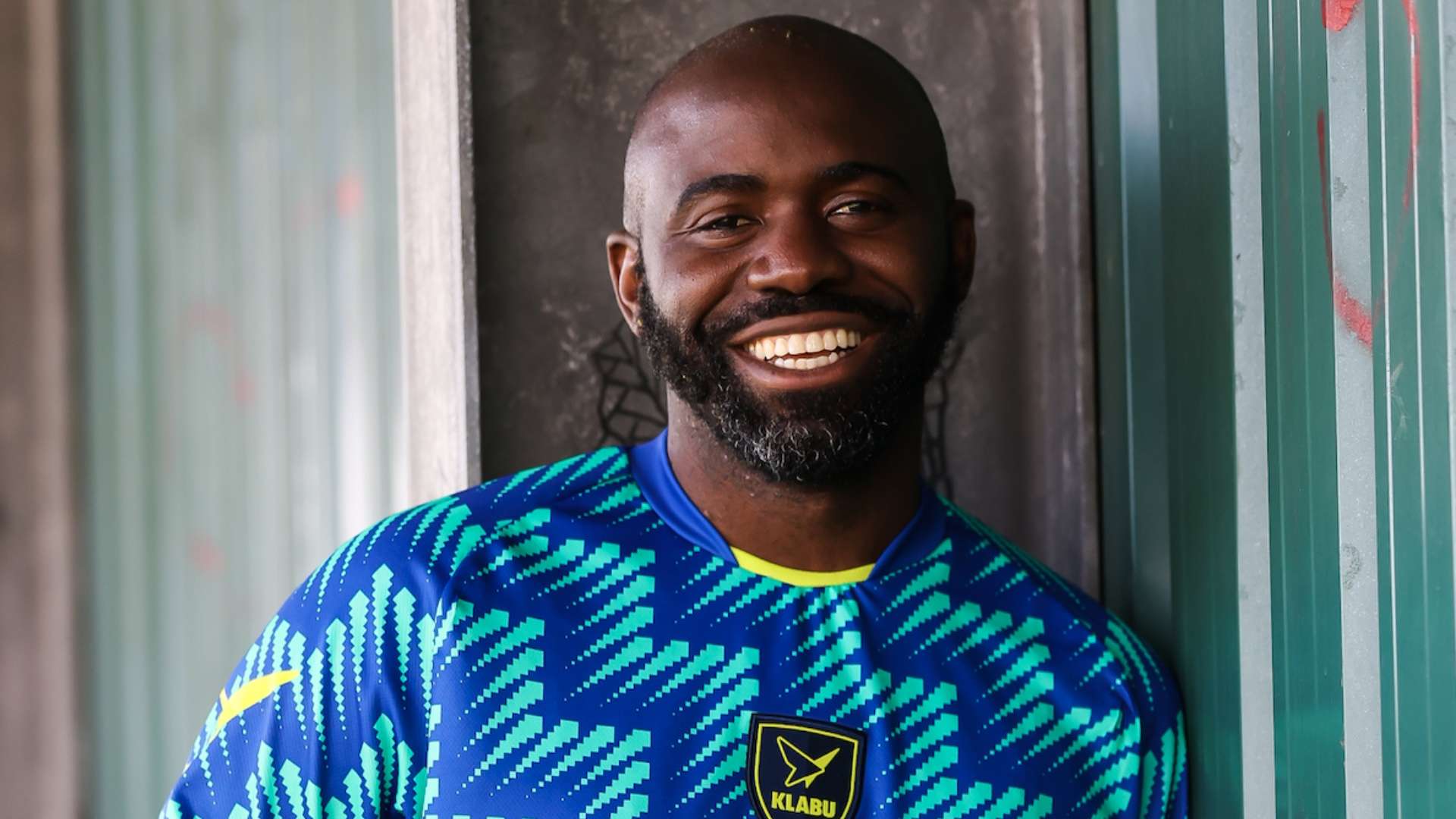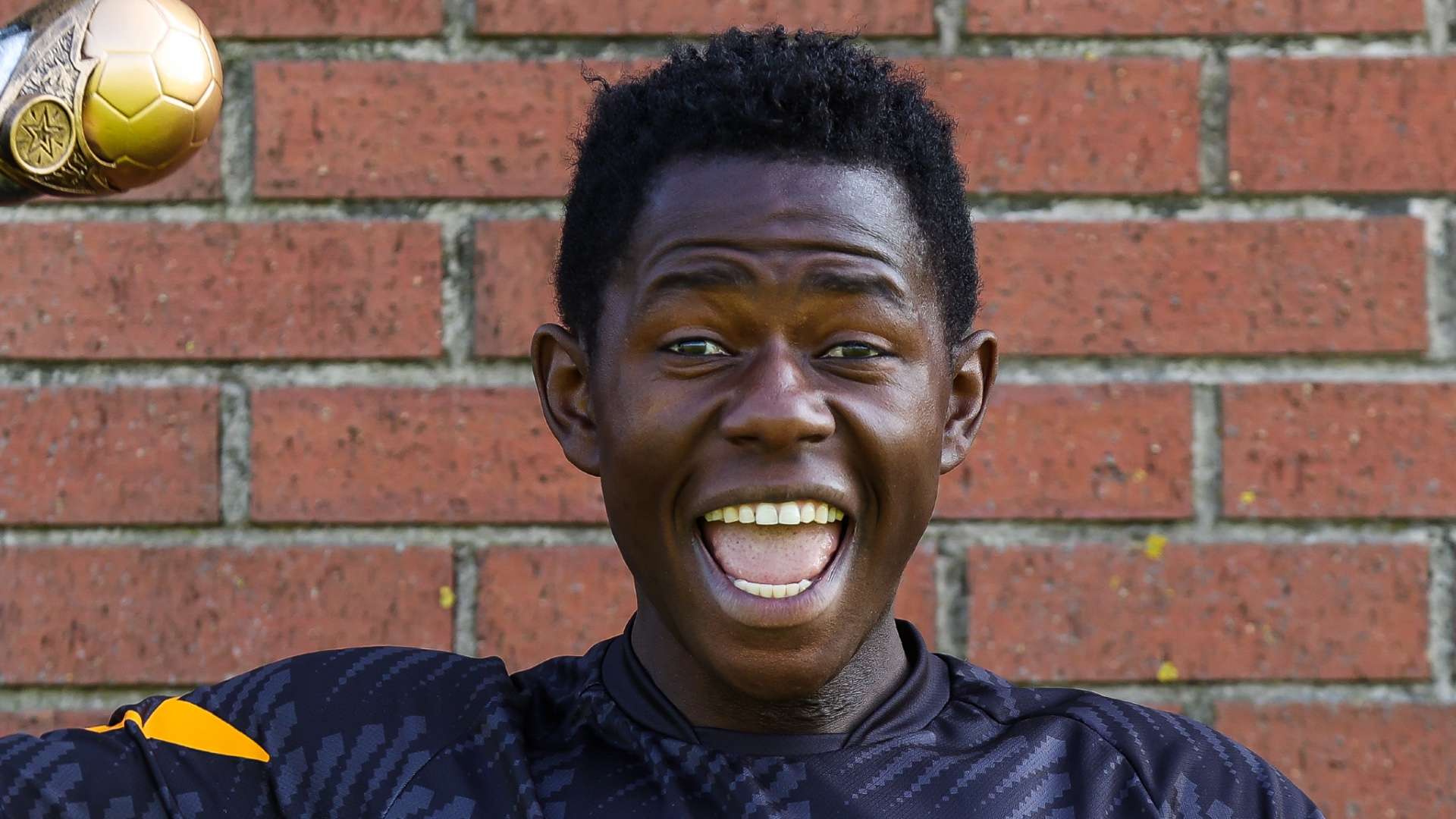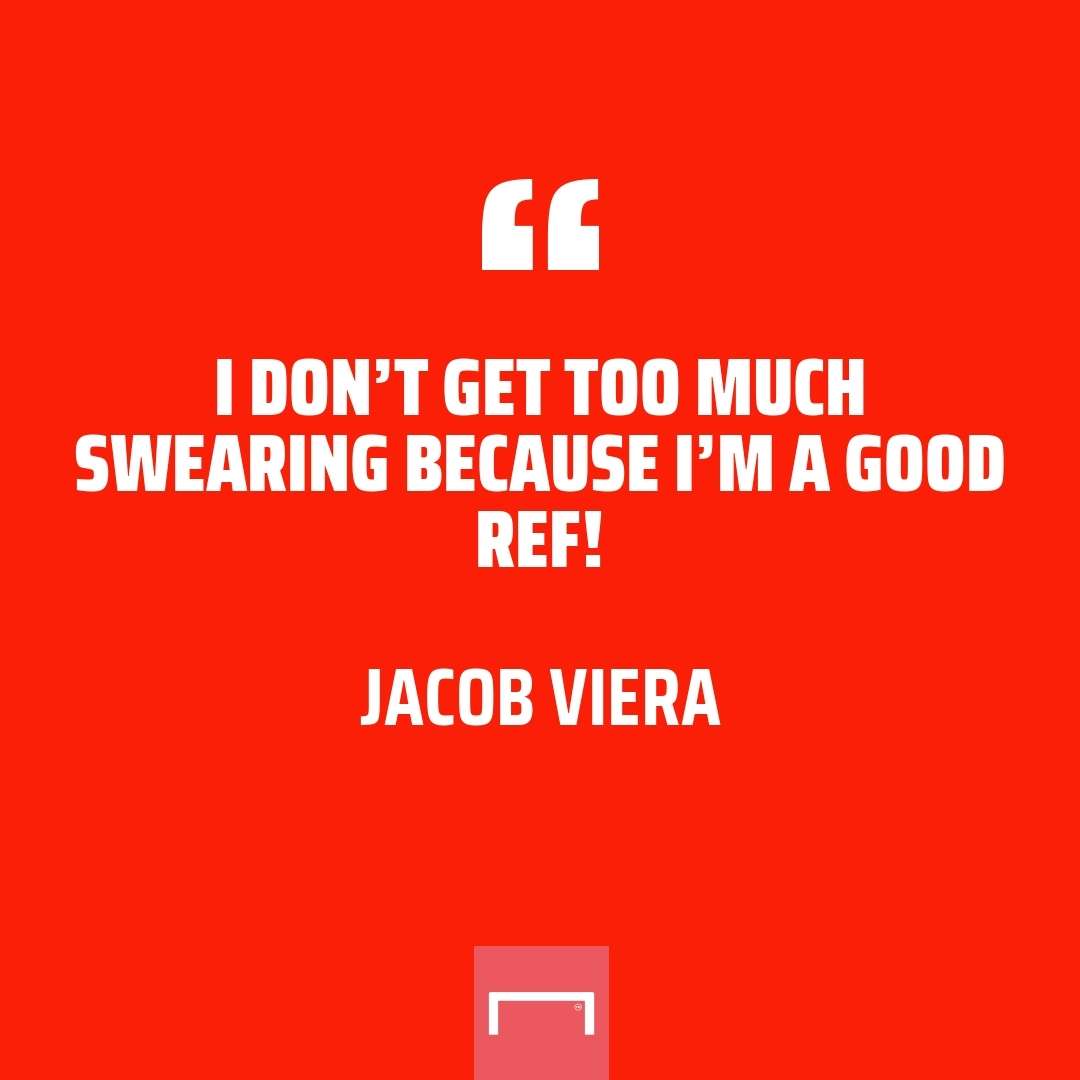Jacob Viera’s grin could light up Liverpool, and his stories could pack out Anfield or Goodison Park.
“I’m a positive person,” he says, with glorious understatement. “There are people in life who are always negative, but I’m not one.”
He can say that again. You know when people talk about 'infectious' personalities? That’s Jacob. He smiles, he laughs, and boy can he tell a tale.
And in the space of half an hour, he treats Goal to a masterclass in the power of positive thought.
“If you want to progress in life, you have to be like this,” he says. “Focus on the positives, don’t listen to the negatives. Me? I’m grateful every single day for what I have.”
We are here, on a cold autumn afternoon at the headquarters of the Liverpool County FA, to watch Jacob referee an 11v11 game between two teams made up of former refugees.
The game has been arranged by KLABU, the Dutch-based not-for-profit organisation which provides refugee camps in Africa and beyond with access to sport and sporting equipment.
Both teams are wearing specially-designed 'Kalobetei Spirit' kits, which will be available to unlock in the new FIFA 21 game, which will be released on October 9.
Watching on from the sideline is Fabrice Muamba, the former Arsenal, Birmingham City and Bolton Wanderers midfielder, who has recently been confirmed as an official KLABU ambassador.
Muamba himself was a refugee, moving to England from Zaire (now the Democratic Republic of Congo) with his family at the age of 11.
He arrived knowing only four words of English - "hello, how are you?" - but used football to integrate himself, to form friendships and make his career, which was tragically cut short when he suffered a cardiac arrest playing for Bolton against Tottenham in 2012.
Now, he is keen to show there is more to life as a refugee than the picture painted in some quarters of the media. Perceptions, he says, have to change, and the likes of Jacob, and some of the (rather gifted) players who feature in the game, can help do that.
“It was a no-brainer for me to get involved in this campaign,” Muamba says, “to support these guys and show there can be a positive end to the story.
“I am one of the positives. I have been fortunate to make the most of the opportunity that England has given me, to make a career of it, to make a living and to be able to support my family.
“To be a refugee in a country like England is not a bad thing. I can see why some people will feel that they are coming over to take their jobs and all that, but these people are coming here for opportunities. And if those people had better opportunities in their own country, then I’m sure they would stay there.
"If I didn’t come to Britain, it would be very difficult for me to achieve what I did. I can see the difficulties [refugees] will face, but my advice to them is that you have to come in with a purpose, to want to make a difference."
 KLABU
KLABU
Jacob Viera certainly embodies that mentality. He grew up in Kenya, and like Muamba was a gifted young footballer, good enough to earn a trial with Newcastle as a 15-year-old, back in 2014.
And that is where his incredible story begins.
“A month before I came over I was going to Tanzania for an Under-16 competitions with the Kenya national team,” he says.
“We had to spend a few days in a hotel before we travelled, and unfortunately I was approached by a gang who wanted me to ferry drugs across the border to Tanzania. They wanted to use me as a mule.
“But I knew the consequences. I wasn't going to do it, so I knew the best thing would be to lie to the drug gang about the date of our departure from the hotel, so that when they came back with the drugs we would already have gone. That worked for me.”
Sensibly, and bravely, Jacob informed his manager of the situation, and when the gang returned to the hotel a few days later they were greeted by the police.
Over in Tanzania, Jacob and his team lost to Uganda in the semi-finals, but it was upon his return to Kenya that the real trouble began.
“I came home after a training session, I opened the door and 'bang!'” he explains. “I was electrocuted. I was unconscious straight away and the skin on my face and neck was scorched off.
"My dad said he feared something like this would happen to me because it had happened to other players who refused to co-operate with the drugs gangs. They will assault you or kill you.
“Fortunately my neighbour found me lying there and rushed me to hospital. I was in hospital for one month.”
Remarkably, Jacob managed to recover in time to travel to Newcastle for his trial.
“There’s no way you turn that down,” he says. “I flew to Newcastle and went to the academy where one of the managers wanted to know why I had pink skin on my face, my neck and my arm. I didn't look like that on any of the pictures or videos they had of me when they invited me for the trial!
“I gave him all the details of what happened and he felt sorry for me. He said I would be safer if I claimed for asylum and was granted permission to stay before signing my pro contract.
“I didn't know what asylum was! But Newcastle explained the process and I said yes. But that meant I wasn't allowed to sign a professional contract until I was granted UK residency.”
A week later, Jacob was on his way to London for his first screening interview. He was put up in a hotel with around 600 other asylum seekers and told to wait. A few weeks later, he was taken to the Home Office for his main interview, after which he was taken to a detention centre in Hammersmith.
“I was there for three weeks in a room for two people that was eight by two metres, with a bed and a toilet, locked in from 8am,” he says. “I’d never been in an environment like that before.”
Football, though, offered some solace.
“We would have games, and I’d be outstanding!” he smiles. “I’m a good player, you know!
“If you won the game you got £2 put on your card. The man of the match also got five quid so I used to make sure I'd always get seven quid put on my card!”
Eventually, Jacob was sent to Liverpool to wait for a final decision on his application for asylum.
“When the wing [at the detention centre] heard I was leaving, it was emotional,” he says. “We were like a family. I was the one who looked after the balls and the cones, so I was like famous there!”
 Avery Dennison
Avery Dennison
On Merseyside he found support within his community, at St Anne’s Catholic Church in Edge Hill and in the world of local football. He joined Mossley Hill FC – “they are like a family to me,” he says – and was invited to train with Everton’s U18 side.
“But because I didn’t have my decision from the Home Office, there was nothing I could do,” he says. “I couldn’t sign professional, I couldn’t work, I couldn’t go to college. I was just expected to stay in my room and wait.
“A lot of people get depressed and have mental health problems. There are a lot of challenges, but I always saw the light at the end of the tunnel. I stayed positive.”
Next came a break, and an unlucky one.
Playing for Mossley Hill, he suffered a ruptured anterior cruciate ligament. He underwent surgery, but thanks to the help of Stuart Carrington and a programme led by the wonderful Everton in the Community charity, he was able to discover a new avenue.
He began refereeing.
“Stuart took me as his son,” he says, beaming. “He got me involved in coaching courses, mental health awareness, all these things.
“That’s how I ended up starting refereeing. He introduced me to the LCFA while I was doing my rehab. I was also linked to Everton in the Community and to the Liverpool FC Foundation. I did work with Asylum Link Merseyside, near St Anne’s, I was volunteering so I was involved a lot in the community.
“I did my referee badge here, and I remember my first game was an Under-7s match. It was only kids, but wow I was nervous! Some of the parents are passionate and emotional, but for me it was just one of the challenges. The weather was another one; when it is winter and it snows, you just want to stay in your blanket, but you can’t!”
Jacob has progressed swiftly. He has now been nominated to attend the FA Core programme, a centre of excellence for referees. Recently, he officiated an England U16 international at Port Vale. He regularly referees at North West Counties level and clearly loves doing so.
“I don’t get too much swearing,” he smiles, “because I’m a good ref!”
 Goal
Goal
He was granted UK residence eventually and now lives in Garston, South Liverpool. He loves it, he says, before telling a story of his first impromptu game of seven-a-side in the city.
“Am I allowed to swear?” he laughs. “OK, so I was new to Liverpool. I went to Wavertree Sports Park, and asked these lads if I could join in.
“We had nearly finished the game, and I score a rabona, top bin!
“I’m only 5ft 6in, but one of my teammates is like 6ft 7in, and he’s come running to me. ‘Lad, you’re a f*cking sick kid, lad!’ he said. I was a bit scared, he was aggressive and I didn’t know what he meant!
“I thought ‘Why am I sick?!’ Where I’m from, to be sick is not a good thing, right? I went back and explained what had happened to my social worker, and he just laughed. ‘Welcome to Liverpool, lad!’ he said.
“After that incident I started learning Scouse, but I didn’t pick up the accent. Scousers swear a lot! They can’t finish a sentence without 'f*cking hell lad', but I don’t swear!
“But I love Scousers. They have done everything for me. People talk about negatives with refugees in Liverpool, and in the UK, but how did I progress? I was given opportunities, and the community helped me to integrate. I am very grateful to them.”
Now, Jacob says he hopes to inspire a new generation of refugees and asylum seekers to realise that they, too, can find a way out of even the most difficult of situations.
“I remember one of the immigration officers at the detention centre used to speak to me about football,” he says. “He’d tell me ‘if you stay in the UK, I will definitely see you in the professional league’.
“He was called Michael Kanyako, I’ll always remember him with his dreadlocks! So one day, I want to make Michael proud by refereeing in the professional league. He will say ‘I told him!' One day, it is possible.”
You may not have heard of Jacob Viera yet, but you will do soon.
“I’m going to the top,” he smiles. “I’m going to be a sick referee!”
Official Premier League partner, Avery Dennison, is the new front of shirt sponsor for KLABU and has been involved with the foundation for a number of years, producing the crests, the chest and sleeve logos, as well as the back graphics and neck tape. Avery Dennison is also the official names and numbers supplier for FC Barcelona, Real Madrid and Bayern Munich.
All KLABU heat transfers are sustainably produced at Avery Dennison’s specialised low-carbon facility in Norway. This factory uses precision laser cuts meant to reduce waste before the products are packed by specialised automated systems and shipped to KLABU.
Buy your kit now from Klabu.org to help unlock sports for young refugees in Africa and beyond




